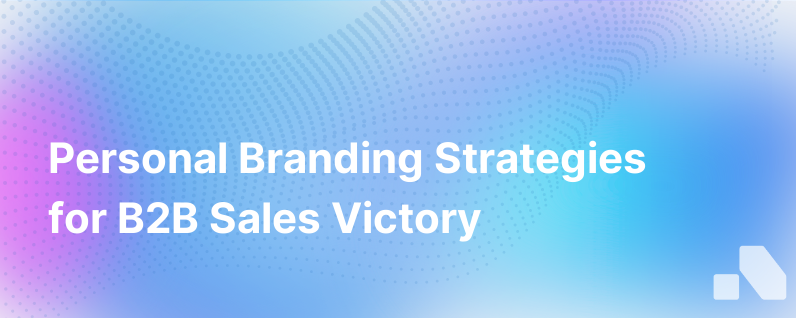
In the realm of B2B sales, the landscape is ever-evolving. Sales professionals are no longer just representatives of their company’s value; they embody the principles, expertise, and persona of the brands they represent. This transposition has led to an undeniable truth: effective personal branding is no longer a luxury—it's an imperative for sales success. There's a vivid demarcation between those who grasp the essence of personal branding and those who have yet to value its magnitude.
Crafting a Stellar Personal Brand
Think of a personal brand as a beacon, guiding prospects through the noisy terrain of the market. It is your professional fingerprint, as distinct and nuanced as your approach to handling complex B2B dealings. Constructing such a brand calls for deep introspection and a methodical stratagem.
Define Your Niche
Specialization is key. The keener your focus, the finer your prospects for resonance and memorability in your chosen field. Expertise in a particular domain not only tailors your personal brand but also enables you to carve a niche that appeals directly to the needs and interests of your target audience.
Consistency Across Channels
Steadfastness in your messaging is your ally. Across every platform and point of communication, whether it be LinkedIn, an industry conference, or your own content channels, your personal brand should speak with a singular, coherent voice. This consistency is the bedrock upon which trust is cemented.
Authentic Engagement
In B2B sales, engagement is the currency of trust. Interacting with sincerity and regularity—the commentary on industry posts, the sharing of pertinent insights, the willingness to participate in broader conversations—each action contributes to a narrative that paints a picture of a sales professional deeply embedded in the fabric of their industry.
Thought Leadership Through Content
Content is the vessel of your expertise, the communicative bridge between knowledge and audience. Production of content—blog posts, whitepapers, webinars, and speaking engagements—should not only reflect mastery but also foster education and discourse. A sales professional who is an accessible fountain of knowledge becomes not just a vendor, but a partner in the client's journey.
Social Proof and Testimonials
The testament of a job well done is best narrated by those whom you've served. In B2B sales, referrals and client testimonials are golden; they're the social proof that reinforces the clout of your personal brand. A digital rolodex of satisfied clients willing to vouch for your expertise and service is invaluable.
Evolving and Reinventing
A personal brand is not a static construct. As industries pivot, so should your brand. Regular audits of personal brand health—online presence, content relevance, network size and quality, sales numbers—all serve as indicators of whether your personal brand is buoyant or in need of an overhaul.
Embrace Digital Tools and Analytics
Leveraging tools for analytics, CRM, and personal branding, like Aomni, can provide actionable insights into how your brand is perceived and the types of engagement it's creating. This continuous feedback loop allows for an informed recalibration of strategies and tactics.
Networking as Brand Fuel
Potent personal brands thrive on connection—not only online networks but also tangible relationships cultivated over coffee, at industry events, and during client engagements. These interpersonal synergies are often the kindling for new opportunities and collaborations.
Personalization and the Human Touch
Technology paves many paths, but human interaction paints them golden. Personal touches—handwritten notes, thoughtful gestures, understanding the person behind the client—these are the nuances that separate the memorable from the forgotten.
Steering Clear of Pitfalls
Integral to this discussion is the awareness of potential blunders. Brands suffer when:
- Authenticity is substituted with facades.
- Content becomes self-serving instead of user-centric.
- Consistency wavers or becomes obsessive rigidity.
- Engagement slips into interruption or overshadows listening.
Integrating Personal Brand in Sales Strategy
Finally, a personal brand is not an island unto itself; it must integrate seamlessly into the broader vista of your sales strategy. It reinforces the value you offer, differentiates your approach, and serves as the lighthouse guiding prospects to your company’s value proposition.
As sales professionals embrace these personal branding principles, they become not only the face of their company but the go-to experts in their field. Each interaction is an opportunity to enrich their brand further, nurture deeper connections, and, ultimately, close more impactful deals.
In conclusion, the personal branding tapestry is intricate. It's woven with the threads of expertise, reliability, engagement, thought leadership, and the human touch—each integral to the B2B sales process. Carefully nurtured, a personal brand becomes synonymous with excellence, shaping the very perceptions that drive decision-making within your industry.
On this path of brand cultivation, remember that tools like Aomni can be instrumental in carving out a unique space that not only pitches but partners with prospects on their journey toward making well-informed B2B decisions.
Sources:
- The Power of Personal Branding in B2B Sales: Igniting Success
- Why Personal Branding is Essential – Especially in B2B Sales
- How to Create a Personal Brand for Social Selling
- 5 Personal Branding Tips for B2B Sales to Attract Clients
- Stand Out With These 5 B2B Personal Branding Tips
- How networking can build your Personal Brand
- 7 Networking and Personal Branding Tips
- Learn how to avoid and overcome six of the most common mistakes that can sabotage your personal brand as a direct sales professional.